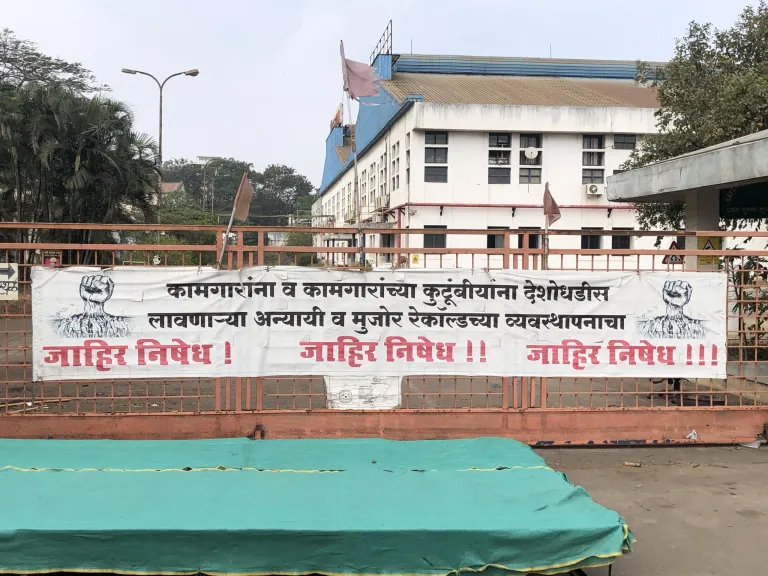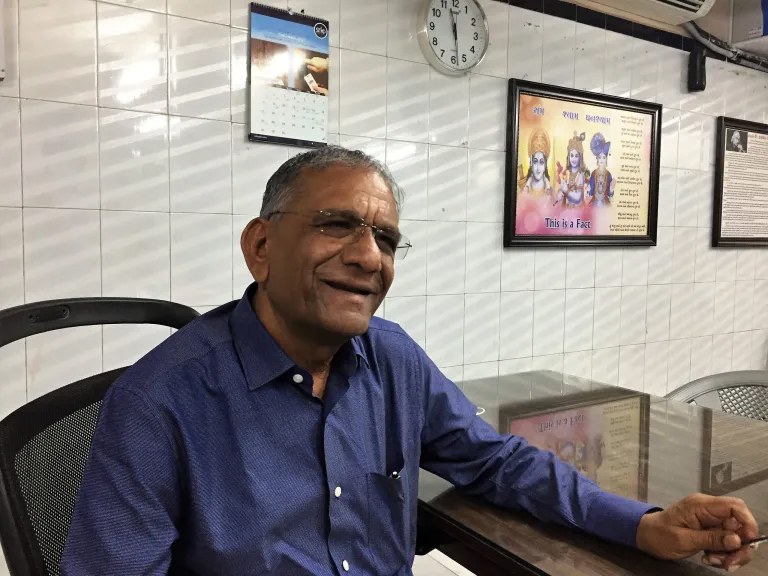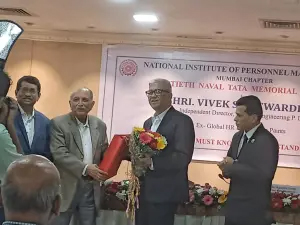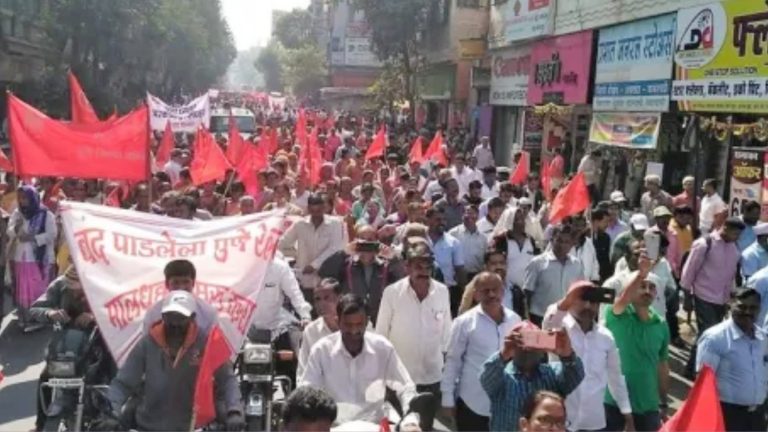At the outset my tribute to National Institute of Personnel Management which has been organizing Naval Tata Memorial Lectures every year for the past 30 years.
(This is the full text of the Naval Tata Memorial Lecture, which I delivered on Dec 16, 2022 at Indian Merchants Chamber, Churchgate, Mumbai)
Mr. Naval Tata was an internationally recognized authority in labour relations, becoming a member of the International Labour Organization’s governing body in 1949. His involvement with the International Labour Organization for over three decades was very fruitful for India. Naval Tata holds the record of being elected to the governing body of the International Labour Organization thirteen times. (Quoted from Wikipedia).
Ladies and Gentlemen, I have been very passionate about industrial relations throughout my career. After retirement, I have been investigating labour issues and blogging about it. That is why I feel honored by the invitation to deliver this 30th Naval Tata Memorial Lecture.
My address is titled ‘People Must Know What We Stand For.’ I will discuss how Industrial Relations Policies of organizations contribute to our understanding of ‘What the organization stands for.’ I will then touch upon five stages of industrial relations and finally I will also present what in my opinion is the industrial relations par excellence, something which we can emulate. And finally, I will share a thought of Mr Nani Palkhivala which captures the essence of developing industrial relations.
Organizations Have Persona
The first point I wish to make is that all organizations have persona. It is created by the ownership structure, by the way decisions are made, by the way products are sold, and more importantly by the way their employees are treated. And yes, by the way conflicts are managed and people policies are implemented.
That is how we have formed some impressions about every employer. We make our own conclusions about what each organization stands for.
In my address today, I will discuss how Industrial Relations Policies of organizations contribute to our understanding of ‘What the organization stands for.’
And we begin with the first question ….
Do you have an Industrial Relations Policy?
I would like to begin by stating the definition of a policy. It means ‘prudence or wisdom in the management of affairs.’ An Industrial relations policy deals with the fundamental question ‘What is just and fair?’ The word ‘just’ means is it legal, and the word fair brings in a value judgment.
I would like to begin by mentioning some events on the industrial relations scenario.
In many companies where employees are employed in continuous process, a permanent employee works in the first shift, but in the next two shifts contract workers work, and their pay is less than half of the permanent worker’s pay.
The question is: Can this practice be stated as a part of the IR Policy? Is it just and fair?
We know several cases where a woman declares her pregnancy and then she is asked to resign. Because she resigns, it gets the cloak of legality. In spite of the law, such incidents happen, and they are not rare.
The question is: Can this practice be stated as a part of the IR Policy? Is it just and fair?
Let us talk about the contract labour. Several organizations pay Minimum Wages to them. For several years the contract workers get minimum wages. What is the implication? In theory, the purchasing power of the worker remains constant over years. In fact, the real wages of the worker diminish over a period of time. Is it right to pay minimum wages to the contract workers who work in an establishment for several years?
The question is: Can this practice be stated as a part of the IR Policy? Is it just and fair?

(Closure)
In 2018, a company in Pune distributed sweets on Diwali day and asked all employees to enjoy Diwali holidays. The company had declared a three days holiday from November 1 to 3 for ‘stock checking.’ Nov 5 to 9 were Diwali days!! It, however, closed down its factory, posted the termination letters just before Diwali, which reached the employees almost on the day after Diwali. The company had shrewdly planned the closure.
The question is: Can this practice be stated as a part of the IR Policy? Is it just and fair?
Managers are forced to take short cuts or maybe they take short cuts willingly when there is no written Industrial Relations Policy. Call it the Employee Relations policy if you wish.
Why is it that most organizations do not have a spelt-out Industrial Relations Policy? And mind you almost all organizations have a well drafted HR Policy. But they do not have an IR Policy.
Even if an organization has no IR policy, there exists a practiced Industrial Relations Policy. We can ask the managers what the practiced IR policy is, but managers would be unwilling to discuss it because there would be too many exceptions.
Now let us discuss what happened at Wistron. Wistron employees turned violent (See The Anatomy of Wistron Workers’ Violence) because several grievances went unheard. Ignored! That was in December 2020, two years ago. Wistron employed nearly 9000 persons as contract labour and the contractors did not pay them as promised and on time. They had to work twelve hours every day. There was no compliance of labour laws in Wistron. When violence erupted Apple placed the Wistron facility under ‘probation’. Wistron then had to comply with the labour laws.
This is interesting. Wistron did not comply with Indian labour laws but it did when Apple threatened to cut business.
Here is a news report which I would like to read out to you: ‘GARMENT WORKERS IN KARNATAKA, INDIA OWED MILLIONS IN UNPAID WAGES’ (Feb 4, 2022)
Over 400,000 garment workers in the garment hub of Karnataka in India have not been paid the state’s legal minimum wage since April 2020. The Worker Rights Consortium calls this the “worst wage theft” ever seen in the global garment industry, with the estimated total amount of unpaid wages exceeding US$58 million. With each month that goes by, the amount owed to the workers will continue to accumulate by more than $2 million.
Back in April, 2020 India increased its “variable dearness allowance” (VDA), a mandatory cost-of-living increase which supplements the legal minimum wage. Garment factories, however, have refused to pay it.
Supplier Shahi Exports, one of India’s largest garment producers, owes more than $10 million to workers making clothes for brands like Walmart, Nike, and H&M.
We have a spectrum of attitudes towards Industrial Relations policy. Some organizations are not declaring their IR policies. It is hurting their employees. There are others like Wistron and Shahi Exports, who willfully flout labour laws and they are not afraid of consequences. We have a range of incidents from unjust and unfair to outright defiance!
The point I am making is that when we do not have a clearly defined Industrial Relations Policy or at least clearly understood Industrial Relations policy (which is very rare), we are jettisoning governance. And for an industrial organization it is a cardinal sin.
Now let us look at what happens when the Industrial Relations policies are defined or when the IR policies are clearly understood.
When Colgate closed down their factory in Sewree, Mumbai they had prolonged conversations with employees explaining the decision to close, worked out a retirement scheme. They paid all workers, called them for a dinner together. I am told it was a very emotional occasion. Contrast this with Pune company story.
Godrej moved its entire plant from Vikhroli to Ambernath. Smooth operation it was. There were issues but they discussed and sorted them out well.
SRK Exports which is based in Surat where 100 permanent workers were employed and 6500 contract workers were employed but there was no differentiation in pay, social benefits or facilities. The owner of SRK Exports, Govindkaka Dholakia, refused to retrench his workers during the economic downturn in 2008. I told him ‘The modern-day manager would disagree with you. He will say you have carried a huge cost.’ Govindkaka Dholakia said, ‘Yes they are right, I carried a huge cost, but the benefit which accrued was even higher.’

(Govindkaka Dholakia)
The SRK Exports story carries a big lesson which is often overlooked. Let me explain. What SRK Exports is practicing is a classic case of Unitarist approach to industrial relations. This approach means all employees, managers and others alike, share a common goal, and their loyalty toward organization. ‘We are all one, and there is no ‘We and They’ here,’ that’s how they will explain their approach. This approach requires setting up of very effective communication programs. A union, in their scheme of things, has no place.
Almost all the establishments in the new age industries do not wish to have a union knocking at their door. This becomes a key result area and no effective communication methods are set up. What managers remember often is that they must not have a union. This results in short sighted decisions like large scale or indiscriminate employment of contract labour. Some believe that employing diploma holders on the skilled jobs will prevent a union from coming in; in the process they provide lower order jobs to the diploma holders driving them to the union.
The Colgate and SRK Exports stories have another message for us. We have to be clear as to what kind of an organization we are building. Colgate, to my mind, accepted the Pluralist approach – they accepted union as a partner in solving industrial relations issues. On the other hand, SRK Exports has done everything to remove ‘We and They’ culture, and build a strong ‘Unitarist’ modelled organization. In both the cases the management consciously decided to have respectively a Pluralist and Unitarist view of their industrial relations. This has clear message for the operating managers. Moreover, they succeeded because their stance on industrial relations was clear to their managers.
Philip Crosby’s Maturity Model
We have discussed what happens when an Industrial Relations policy does not exist and also when it is operational. I was reading Philip Crosby’s famous book ‘Quality is Free.’ Crosby talks about five stage maturity model. It resonated with me, and I am interpreting it in the Industrial Relations context. A maturity model describes stages of a process. Higher the maturity means better the process.
The first two stages are Uncertainty and Awakening. Believe it or not, several companies do not explicitly spell out ‘who is responsible for Industrial Relations in the company’. That is the first question to answer in an Industrial Relations Policy. When you don’t fix the responsibility, which happens in the Uncertainty phase, problems of IR are considered as the fault of someone else. That we think is the result of not being tough on the bad guys.
At the Awakening stage we realize that good industrial relations is all about motivating people. So, employee of the week, some contests are designed. But we realize that this is inadequate.
We then reach the third stage which is ‘Enlightenment.’ At this stage we introduce specific programs for improving industrial relations. These are comprehensive, they include dialogues, training, and information sharing etc.

(Pic Courtesy Sarah Ardin on Unsplash)
The 1956 agreement of Tata Steel is a landmark agreement in this direction. It was signed by JRD Tata on behalf of Tata Steel. This agreement is an outstanding document because it nearly details the IR Policy.
The game of Industrial Relations is one of making rules jointly. The Tata Steel agreement is a classic example. Tata Steel has built its industrial relations on this solid foundation.
I would also like to talk about ASAL, another Tata Group company where interestingly rules of the game were created by the workers’ union.
Interestingly at ASAL (Automatic Stampings and Assemblies Ltd) their union suo moto gave an assurance to the management in writing that they will not indulge in violence and will make a proposal for productivity improvement. This was a radical shift. There was a substantial productivity increase and so also a reasonable increase in pay to workers. (ASAL had accumulated losses). The company reportedly has not been able to capitalize on the initiative of the Union.
There is a lesson to learn here. Relationship is developed proactively and not reactively. This is true even in our personal life.
The fourth stage is Wisdom. In this stage the company has a chance to make the changes permanent. I would like to mention here the case of Thermax Company’s Savli plant near Baroda. The plant was run almost completely by contract labour. The industrial relations there reached its nadir and even gun shots were fired at the gate. But thanks to Sharad Gangal and his team, they transformed the relations for the better, laying down clear rules of the game. In the process they have also done novel experiments, in that they have trained women welders and many of them come from Tribals community. They have defined a clear pathway for development of people. I have covered this in my blog and also in the videos which I have recorded.
The last stage is called Certainty. Building relations is a continuous activity. Industrial relations issues are not allowed to surface except in unusual cases because they have open and meaningful conversations among employees at all levels.
This is not as simple as it appears, because most of the management problems have more than one right solution. Consider for instance this case: An employee dies in an accident while on duty. Union asks his wife to be employed. Management wants to give a hefty compensation which will get the wife of deceased employee an income higher than his salary.
What choice will you make? Both the options are okay, but one must be chosen and managers have to be aware that their action discloses a certain value preference. This calls for open and meaningful conversation which is a rare skill. This also requires establishing participation at the highest level.
I am tempted to share the agreement between Shell and its Union which takes the game of industrial relations at the highest level. It is amazing.
In 1988, the Singapore Shell Employees Union documented its future direction in the plan of action, “Facing the Future – Plan of Action for the 1990s”.
In 1991, the Company launched their mission and vision statements to the employees. This was in response to a perceived need among the employees to know what the company’s basic beliefs are and the direction the company is heading.
Both the Company and Union re-affirmed their full commitment to the Shared Industrial Relations Vision at a Conference held on 24 September 1999.
Shell Companies in Singapore and Singapore Shell Employees’ Union are committed to the well-being of employees.
We believe that this requires a successful Company and an effective Union working together in a strategic alliance to meet challenges, seize opportunities, solve problems and enhance the quality of work life in an ever-changing environment. To this end,
We will conduct industrial relations in a professional, pragmatic, consistent, consultative and enlightened manner with mutual respect, trust and openness at all levels.
We will ensure that employees are well remunerated, and rewarded in accordance with performance.
We will ensure that employees are treated fairly, with trust, respect and care.
We will promote an environment in which employees are well-informed, motivated and empowered to perform their best.
We will ensure that employees are highly trained and developed to the best of their abilities.
We will promote a safe and healthy working environment through the highest safety standards and greater awareness on issues related to health, safety and environment.
We will ensure the long-term viability and growth of the Company through productivity improvement, innovation and quality improvement in products and services.
We will ensure that Union remains effective by supporting its activities and informing, consulting and involving it in matters affecting employees.
The fulfilment of this vision requires the commitment, involvement and participation of all employees.
(Reaffirmed in 1999 Shared IR Vision)
This statement of Shell is the recognition that it takes two to tango. And both the parties have made total commitment to creating harmonious industrial relations.
There is a big message here. All organizations are a part of the Society. What organizations do impact the society. Therefore, we must think of why do organizations exist. What their purpose is.
Almost all organizations write their purpose on their website. My understanding is that broadly speaking, all organizations must work to make a better society. The Shell Company and Singapore Shell Union’s declaration must be seen in this light as a big step forward.

Once we jointly commit ourselves to a certain purpose, resolution of conflicts is not difficult. People must know what we stand for as an organization, be it a company or a union. Then we have reached the final stage in the maturity matrix in my opinion.
And finally ….
In any relationship, between two persons or between two groups, there is no substitute for a meaningful and open conversation. When the conversations are inadequate people make assumptions. And assumptions are the termites of relationships as Henry Winkler has said.
The best insight in developing industrial relations comes from Nani Palkhivala. His 1984 convocation address at XLRI is titled ‘Obedience to the Unenforceable.’ You can enforce a law, but you can’t enforce good conventions and etiquettes. Plain legal compliance is the basic foundation, and to develop any relationship one must travel beyond it which is often unsaid and something which can’t be ‘enforced’. ‘Obedience to the Unenforceable’ is the mantra in industrial relations. It defines who you are and what you stand for. The Indian Hotel story of how they handled the aftermath of 26/11 is a shining example of ‘Obedience to the Unenforceable.’
As we work, as we make and implement policies, our persona gets created. The persona of the organization gets created. People come to know what you stand for, and they also come to know what you do not stand for.
Article originally published at vivek’s world – http://vivekvsp.com/2022/12/industrial-relations-policy/
Stay connected with us on social media platform for instant update click here to join our LinkedIn, Twitter & Facebook

























Add comment